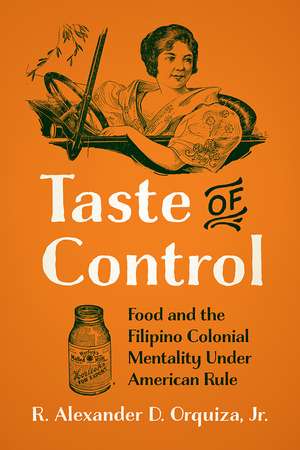Taste of Control: Food and the Filipino Colonial Mentality under American Rule
Autor René Alexander D. Orquiza, Jr.en Limba Engleză Paperback – 17 iul 2020 – vârsta ani
Winner of the 2021 Gourmand Awards, Asian Section & Culinary History Section
Filipino cuisine is a delicious fusion of foreign influences, adopted and transformed into its own unique flavor. But to the Americans who came to colonize the islands in the 1890s, it was considered inferior and lacking in nutrition. Changing the food of the Philippines was part of a war on culture led by Americans as they attempted to shape the islands into a reflection of their home country.
Taste of Control tells what happened when American colonizers began to influence what Filipinos ate, how they cooked, and how they perceived their national cuisine. Food historian René Alexander D. Orquiza, Jr. turns to a variety of rare archival sources to track these changing attitudes, including the letters written by American soldiers, the cosmopolitan menus prepared by Manila restaurants, and the textbooks used in local home economics classes. He also uncovers pockets of resistance to the colonial project, as Filipino cookbooks provided a defense of the nation’s traditional cuisine and culture.
Through the topic of food, Taste of Control explores how, despite lasting less than fifty years, the American colonial occupation of the Philippines left psychological scars that have not yet completely healed, leading many Filipinos to believe that their traditional cooking practices, crops, and tastes were inferior. We are what we eat, and this book reveals how food culture served as a battleground over Filipino identity.
Filipino cuisine is a delicious fusion of foreign influences, adopted and transformed into its own unique flavor. But to the Americans who came to colonize the islands in the 1890s, it was considered inferior and lacking in nutrition. Changing the food of the Philippines was part of a war on culture led by Americans as they attempted to shape the islands into a reflection of their home country.
Taste of Control tells what happened when American colonizers began to influence what Filipinos ate, how they cooked, and how they perceived their national cuisine. Food historian René Alexander D. Orquiza, Jr. turns to a variety of rare archival sources to track these changing attitudes, including the letters written by American soldiers, the cosmopolitan menus prepared by Manila restaurants, and the textbooks used in local home economics classes. He also uncovers pockets of resistance to the colonial project, as Filipino cookbooks provided a defense of the nation’s traditional cuisine and culture.
Through the topic of food, Taste of Control explores how, despite lasting less than fifty years, the American colonial occupation of the Philippines left psychological scars that have not yet completely healed, leading many Filipinos to believe that their traditional cooking practices, crops, and tastes were inferior. We are what we eat, and this book reveals how food culture served as a battleground over Filipino identity.
Preț: 234.24 lei
Nou
Puncte Express: 351
Preț estimativ în valută:
44.82€ • 47.93$ • 37.37£
44.82€ • 47.93$ • 37.37£
Carte disponibilă
Livrare economică 27 martie-10 aprilie
Preluare comenzi: 021 569.72.76
Specificații
ISBN-13: 9781978806412
ISBN-10: 1978806418
Pagini: 224
Ilustrații: 18 b&w images
Dimensiuni: 140 x 216 x 15 mm
Greutate: 0.27 kg
Ediția:None
Editura: Rutgers University Press
Colecția Rutgers University Press
ISBN-10: 1978806418
Pagini: 224
Ilustrații: 18 b&w images
Dimensiuni: 140 x 216 x 15 mm
Greutate: 0.27 kg
Ediția:None
Editura: Rutgers University Press
Colecția Rutgers University Press
Notă biografică
RENÉ ALEXANDER D. ORQUIZA, JR. is an assistant professor of history at Providence College in Rhode Island, where he teaches courses on nineteenth and twentieth-century U.S. history. His articles and essays have appeared in Food and Foodways, Asia Pacific Perspectives, Savoring Gotham: A Guide to New York Culinary History, and Eating Asian American: A Food Studies Reader.
Cuprins
Contents
Introduction
1 First Impressions
2 Menus
3 Travel Guides
4 Cookbooks
5 Education
6 Advertisements
Conclusion
Acknowledgments
Index
Introduction
1 First Impressions
2 Menus
3 Travel Guides
4 Cookbooks
5 Education
6 Advertisements
Conclusion
Acknowledgments
Index
Recenzii
“Taste of Control is an original, ambitious project that joins a growing body of scholarship that takes food as a window into analyzing American history and culture.”
“Taste of Control is a rare and refreshing example of how historians can (and must) make the past come alive with a sense of intellectual urgency and vibrancy.”
"This revealing study explores in vivid detail the ways that food and food cultures in the Philippines under U.S. colonial rule—from the colonizers’ lavish banquets to cookbooks to domestic science classes to advertisements for imported canned foods—represented a significant site where the meanings of U.S. power were articulated and contested. Tapping into fresh primary sources, it provides a new and significant culinary lens onto the making of Philippine-American colonial hierarchies of race and civilization."
"That Orquiza leaves us hungering for more of these connections is a testament to the strength of his research and the urgency of his work."
"Recommend[ed]. This book as it contains wide-ranging information on the mindset of the Americans in the colonial Philippines."
Descriere
Taste of Control tells what happened when American colonizers began to influence what Filipinos ate, how they cooked, and how they perceived their national cuisine. Drawing from a rich variety of sources including letters, advertisements, textbooks, menus, and cookbooks, it reveals how food culture served as a battleground over Filipino identity.
